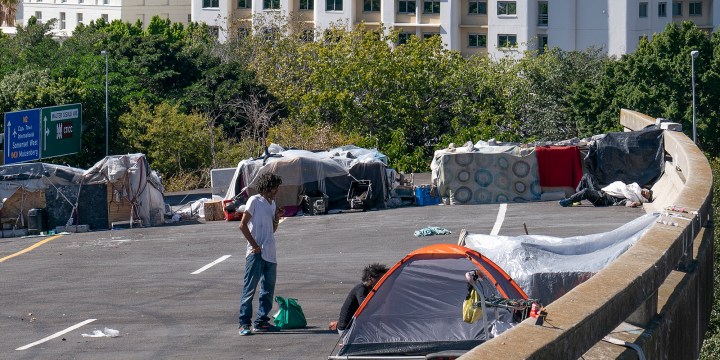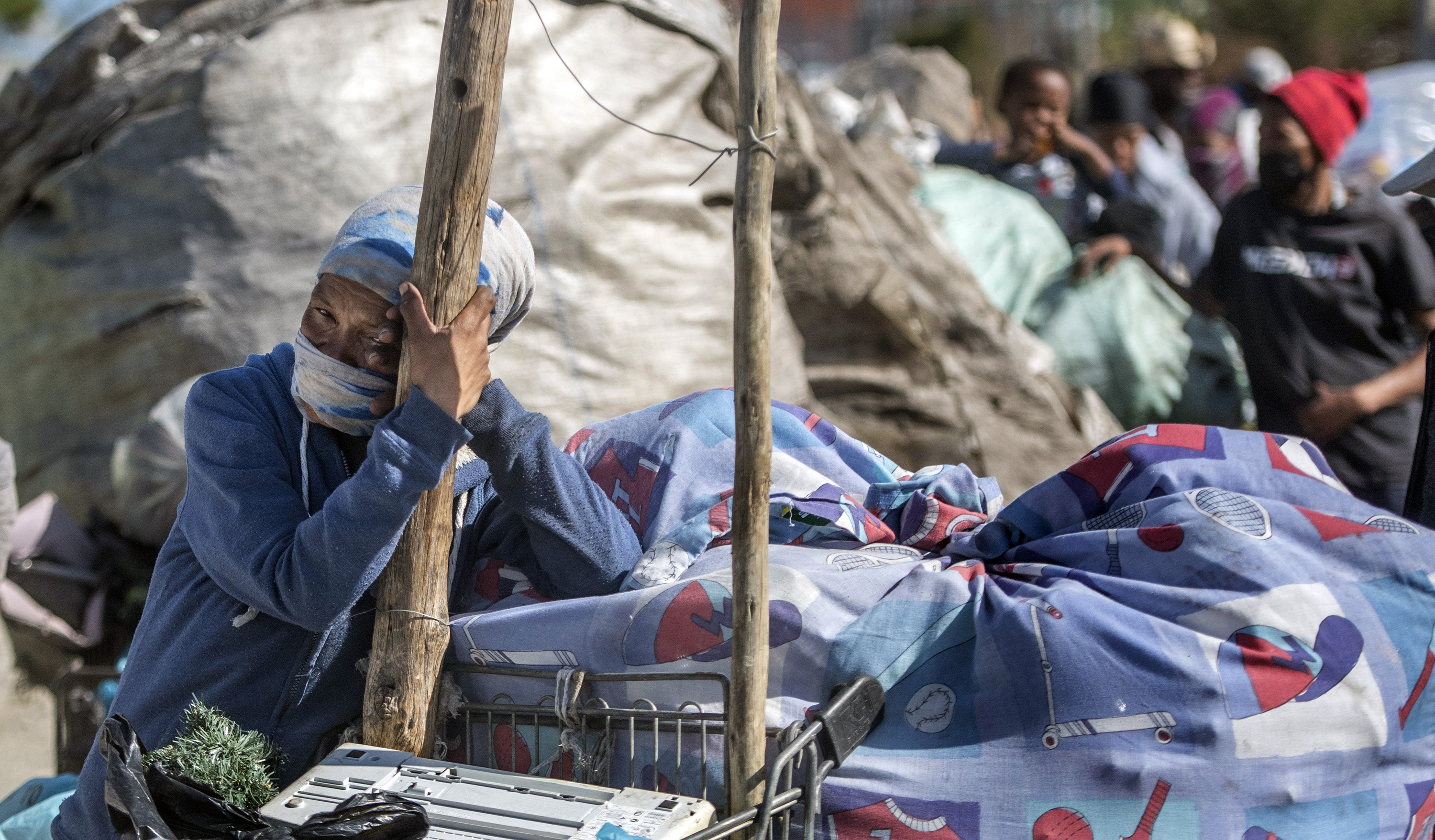CAPE TOWN HOMELESSNESS OP-ED
Dear Mayor Geordin Hill-Lewis, we litigate to hold power to account – that’s the role of civil society

Unlike you Mr Mayor, we are not interested in a popularity contest. We litigate and resort to the courts to ensure that the executive does not trample on the rights of marginalised people and to uphold the Bill of Rights.
We have noted the Opinionista by Mayor Geordin Hill-Lewis, “The City is making slow but steady progress on Cape Town’s homelessness crisis” (Daily Maverick, 31 August 2022) and wish to respond with a few remarks.
We appreciate that the City of Cape Town is trying to change its approach to unhoused people to one of dignity and care. The approach of care is critical when engaging people living on the street. The abuse and criminalisation of homelessness is why we are providing legal representation to 11 unhoused people in the Gelderbloem case which challenges the constitutionality of two city by-laws.
While we appreciate that you, Mr Hill-Lewis, are trying to change the city’s approach, you need to appreciate that the city’s track record is disappointing.
As a civil society organisation, we have represented four different unhoused communities in the past year where the exact opposite of a “caring” approach has occurred. Law enforcement has consistently harassed, and illegally confiscated personal possessions. In doing so the city acts as judge, jury and executioner in its own cause, a serious breach of the rule of law and fundamental principles of natural justice.
The criminalisation of homelessness in the two city by-laws reflects an age-old racist prejudice of the unhoused as unwanted vagrants in predominantly white urban areas. The dispossession of homeless communities’ tents and personal belongings has attracted local, national and international media attention (see here, here, here, here, here, here, here, here, here, and here).
Harassment and abuse
There is very little confidence among the unhoused that the city cares if many in this community have experienced harassment and blatant abuse by law enforcement and private security. As recently as July this year, we represented 45 unhoused people living outside the Castle of Good Hope in the high court where the city did not offer alternative accommodation before they removed tents and personal belongings of our clients. It is crucial that the mayor translates these aspirations into reality and ensures that law enforcement officers follow laws and policies.
A question that the mayor and the city cannot comprehend is why would anyone prefer to stay on the street instead of the safe spaces that “offer dignity”? The same civil society organisations referred to by the mayor as being instrumental in resolving homelessness, and no less than five NGOs, have signed affidavits in the Gelderbloem matter in support of our clients detailing why the safe spaces programme does not provide dignity.
The carceral rules in place to manage safe spaces, such as the separation of families and partners and a day-time lockout rule, do not encourage a sustainable pathway off the street. Addressing this requires the city to engage with people experiencing homelessness to understand what form of shelter system will actually work. This is not about the rhetoric of engagement and participation, but a genuine understanding of the needs of the people that find themselves on the street.

Sharlene George (35) said cold mornings and pushing heavy trolleys makes waste picking tough, but the effort is worth it as it helps her care for her eight children. (Photo: Brenton Geach)
Also, the numbers do not lie — there are close to 3,500 beds available for street-based people in Cape Town, but the conservative estimate is that there are close to 15,000 people living on the street. Irrespective of the limited number of beds, the reality is that what is on offer are temporary shelter spaces that cater for those who find themselves temporarily experiencing homelessness. These shelter options do not address long-term homelessness.
Moreover, while some would argue that drug or alcohol use is the most logical choice to cope with extreme poverty, many of the individuals experiencing chronic homelessness — as noted by you, Mr Mayor — suffer from debilitating mental or physical conditions, including the illness of addiction and trauma.
Transitional housing
As such, what the majority of our street-based population requires is permanent, safe and secure tenure — also known as transitional or supportive housing — which we discussed in our earlier op-ed on alternative solutions. This form of housing provides more than a bed — it provides a home — and access to other much-needed social services.
One of these services is employment support through, for instance, the EPWP or PEP programme. Combining housing with an employment opportunity has been proven to be very successful. For instance, with developmental support, 90% of PEP clients were off the streets at the end of the six-month project.
Mr Mayor, you also say: “we expect that our efforts will be opposed by various activist groups who litigate to stop any legal action by the city, but who do not themselves provide any alternative ideas (nor indeed their own resources) for how to make meaningful progress in getting people off the streets.”
Visit Daily Maverick’s home page for more news, analysis and investigations
We receive sufficient hate mail and abuse from councillors and ratepayers to know that our litigation and advocacy efforts are unpopular among certain sectors of society. Unlike you Mr Mayor, we are not interested in a popularity contest. Our objectives are to fight against human rights abuses and hold the government and the private sector to account. We litigate and resort to the courts to ensure that the executive does not trample on the rights of marginalised people and to uphold the Bill of Rights.
Of the four different communities we have represented in legal proceedings, two separate judges have declared the actions of law enforcement unlawful, and in the other two cases, the city has agreed to return confiscated tents to where they were dispossessed — ie to undo their illegal acts. The number of times we have had to litigate strongly suggests that we are not wildly litigating cases without merit, but upholding human rights in spite of the attacks we receive.
Litigation alone is no solution
Perhaps the mayor and city should also read what we publicly said months ago — that litigation alone will not solve the crisis of homelessness. Even the Daily Maverick article titled it as an “alternative intervention op-ed.” We hope this gives a clear indication that we are working collaboratively with organisations that are working with people living on the street, and, that in fact, it’s the city, province and national governments that are missing in these conversations.
On the causes of homelessness, the mayor seems to suggest that evictions just happen because people can no longer pay their rent. There is, however, a deeper historical and socio-spatial context that the mayor seems to ignore.
The cause of the housing crisis in South Africa lies fundamentally in our history, where the toxic legacy of the apartheid zoning and spatial planning system remains imprinted on the spatial structure of South African cities to this day. This has created poverty traps that are very difficult to escape.

Rivertrail settlement in Rondebosch, Cape Town. (Photo: Suné Payne, Daily Maverick)
Compounding the historical causes, from the late 1990s, the approach to urban regeneration spearheaded by the city, province, and the Cape Town Partnership has forced lower-income households out of the centre of the city and has not provided new housing opportunities for those wanting to live closer to the CBD.
Furthermore, since 2017, many parcels of land (some for more than a decade) have been earmarked for state-subsidised social housing, but we are yet to see bricks and concrete on these sites. In the District Six matter, where we represented a community of unhoused people, Judge Rosheni Allie agreed with the above assessment and placed the blame for unlawful occupation of land on the city’s failures.
Unchecked property prices
Encouraging rampant private development and unchecked property prices — which result in unaffordable rentals, eviction and displacement — are not national government failures, as the mayor suggests. Furthermore, the disposal of prime, well-located public housing to private entities is a local and provincial government failure. It makes little sense to decontextualise and scapegoat local issues if there is a true desire to develop “sustainable solutions”. It also doesn’t make sense to ignore the inter-relationship between spatial apartheid, the housing crisis, and unchecked property markets in any effort to resolve the rise in homelessness.
We are not the cause of homelessness and the issue would prevail regardless of our existence as an organisation. We have exposed the indignity and inhumanity of by-laws that criminalise homelessness (laws that have subsequently been amended to partially address this concern).
So it would be wise to not blame us for a social phenomenon that we have tirelessly advocated to address. DM
Dr Jonty Cogger and Danielle Louw are attorneys with the legal centre of Ndifuna Ukwazi.





















 Become an Insider
Become an Insider
Comments - Please login in order to comment.